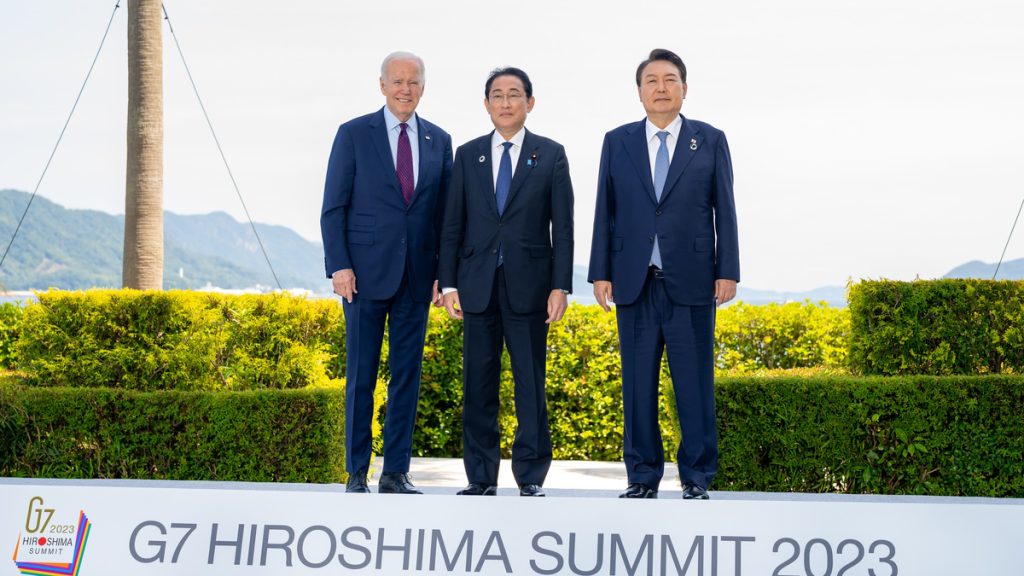On May 21, 2023, United States President Joe Biden, South Korean President Yoon Suk-yeol, and Japanese Prime Minister Fumio Kishida discussed trilateral cooperation projects on the sidelines of the G7 summit. One cooperation venture that was discussed was the confrontation of North Korea with regards to the alleged threat its nuclear weapons and missile systems pose to regional stability, per a White House statement.
“President Biden met today with Prime Minister Kishida Fumio of Japan and President Yoon Suk Yeol of the Republic of Korea in Hiroshima, Japan. He commended Prime Minister Kishida and President Yoon on their courageous work to improve their bilateral ties, noting that our trilateral partnership and the Indo-Pacific are stronger because of their efforts. The leaders discussed how to take their trilateral cooperation to new heights, including with new coordination in the face of the DPRK’s illicit nuclear and missile threats, on economic security, and on their respective Indo-Pacific Strategies,” the statement highlighted.
While most attention in East Asia is focused on the US vs. China rivalry, North Korea is one potential conflict zone that shouldn’t be overlooked. The Korean War (1950-1953) ended with the Korean Armistice Agreement being signed on July 27, 1953. This armistice ended all belligerent activity on the Korean peninsula, however it did not establish a decisive peaceful settlement to the conflict.
Since then, an uneasy peace has engulfed the Korean peninsula. In effect, the Korean peninsula has been in a frozen conflict state for nearly 70 years. Tensions have remained due to North Korea’s nuclear status.
According to several estimates, North Korea is believed to be in possession of roughly 40-50 warheads. The regime of Kim Il Sung (1948-1994) saw how the atomic bombings of Hiroshima and Nagasaki brought Imperial Japan to its knees, which prompted North Korean leadership to start creating a long-term plan to build nukes. The North Korean regime began accelerating this nuclear program in the late 1980s and early 1990s as it became clear that its Cold War relationships were beginning to fray due to the dissolution of the Soviet Union in 1991. In turn, such a development would create a security dilemma that necessitated the development of a nuclear program to defend North Korea’s sovereignty.
Since then, North Korea has routinely conducted missile tests much to the consternation of its South Korean and Japanese neighbors and the US. Even China has been disturbed by the North Korean regime’s erratic behavior. Despite being North Korea’s largest trading partner, China halted the importation of coal, iron, iron ore, and seafood from North Korea in response to North Korea’s testing of an intercontinental ballistic missile that could reach Alaska back in 2017.
While China has been a solid strategic partner for the North Koreans, the relation between the two countries is a bit nuanced. For one, North Korea prefers being a hermit state that is not necessarily keen on cooperation. For example, the uncle of Kim Jong-Un, Jang Song Thaek was executed in 2013 after being accused of engaging in acts of treason. In this instance, Jang allegedly met with then-Chinese President Hu Jintao in August 2012 and hatched a plot to oust Kim Jong Un and replace him with his elder half-brother — a move that would have China’s support.
Despite the ups and downs of the North Korean-Chinese partnership, the two countries’ relations will likely tighten as the US pivots to Asia. The US’s grand strategy is animated by a universalist ethos that sees all politically deviant nations as potential targets for regime change that must be remade in the US’s increasingly dysfunctional image. Just like China, Iran, and Russia have all strengthened ties with each other in response to the US’s moves to contain them a similar dynamic will be in play in East Asia when the US ramps up its China containment efforts in the next few decades. When countries share a common enemy, especially one that could pose an existential threat to their sovereignty, any small differences the two countries share will be shelved for the time being.
Rest assured, China and North Korea will stand united against all efforts to destabilize the Korean peninsula.
